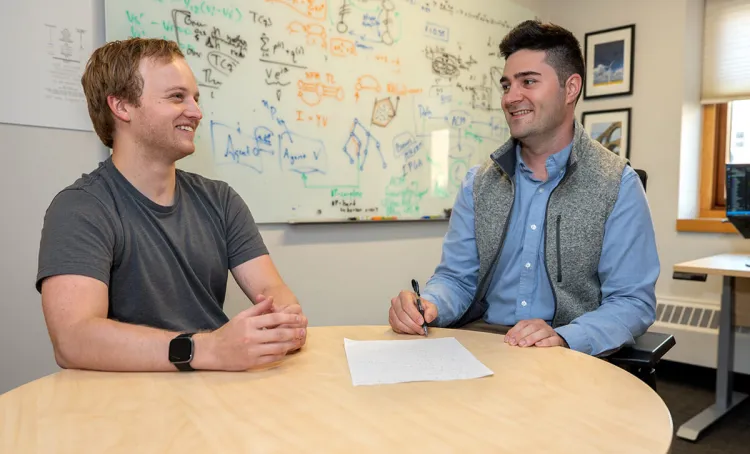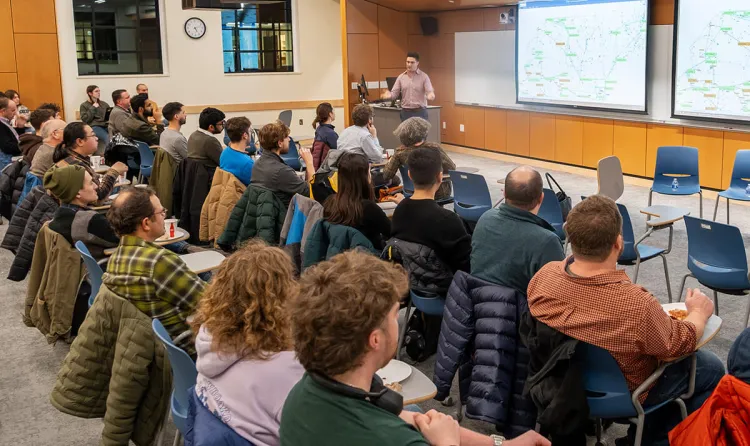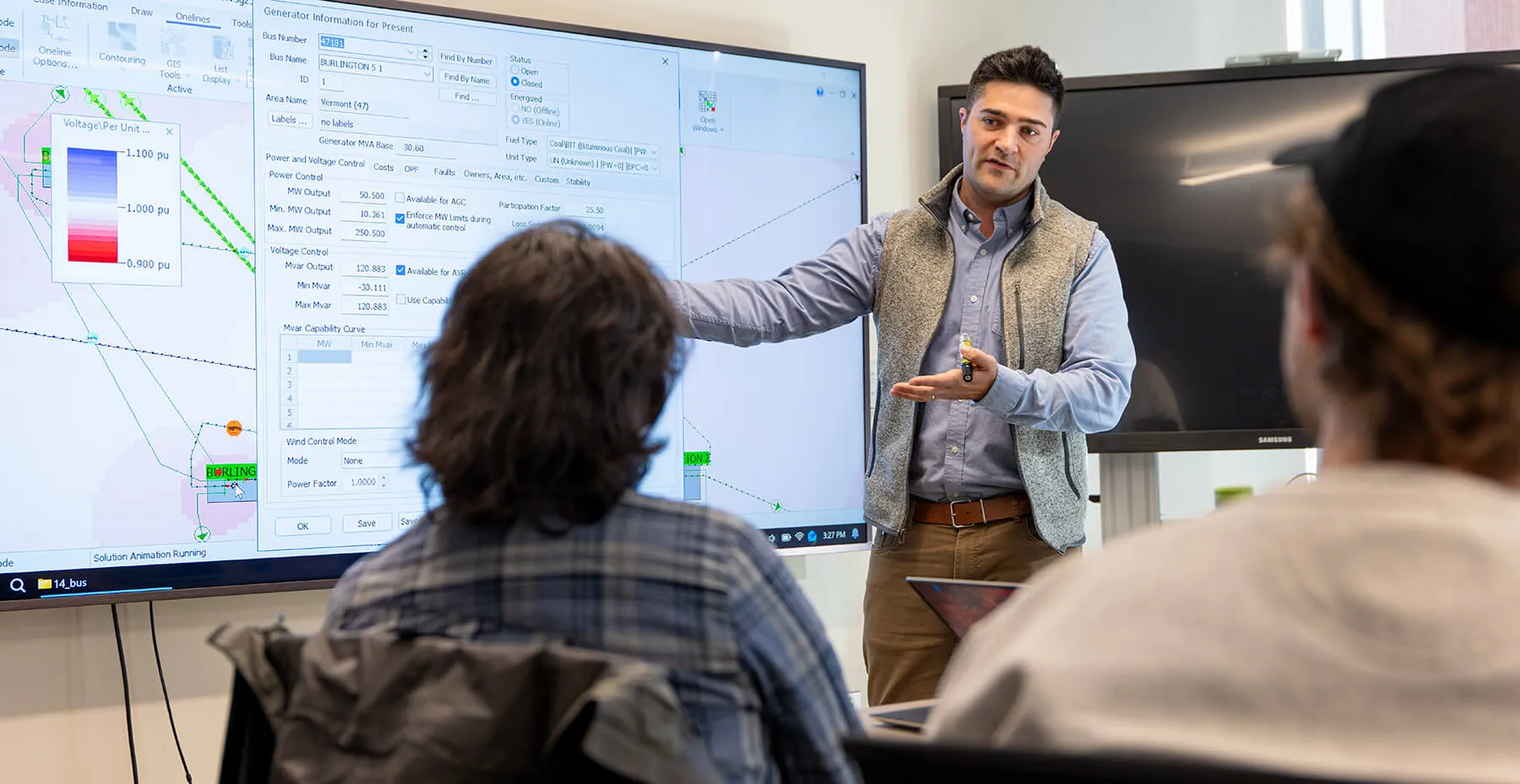Across the nation, electric power providers are grappling with an uncertain future as the grids that form the backbone of our energy infrastructure age and confront unprecedented new demands from renewable power generation, expanding electrification of transportation and homes, and the rapid expansion of data centers serving the new frontiers of a world embracing AI.
Somewhat ironically, the electric utility sector has been slow to adopt AI, specifically the potential of machine learning, to better meet these challenges, as emerging technologies generally lack the assurances needed to ensure the safety-critical delivery of power that lives depend on.
UVM Electrical and Computer Engineering Assistant Professor Sam Chevalier is endeavoring to address this need through the development of advanced algorithms and computational tools to rigorously verify machine learning models that could help transform the electric power industry.
“We describe power grids as safety-critical infrastructure in the sense that when there’s a blackout or a major outage, lives are at stake, so it’s essential that the integrity of the grid remains intact.”
Assistant Professor Sam Chevalier
Department of Electrical and Biomedical Engineering
Chevalier was recently awarded a prestigious CAREER award from the National Science Foundation (NSF) for his research project to formally validate the performance of machine learning models specifically deployed in power system applications. As existing verification methods are insufficient in scale and relevance to real-world power grid challenges, Chevalier proposes addressing these gaps by combining expertise in machine learning verification and power system optimization to create scalable, practical verification frameworks.
As the power grid transitions toward renewable energy, machine learning is poised to play a crucial role in managing increasing complexity and uncertainty. “There are a number of exciting use cases for machine learning type technologies to help grid operators with smarter power dispatch, with network reconfiguration, with load control for ensuring that diverse energy assets are utilized optimally,” said Chevalier. The work he hopes to pioneer in his research lab would develop computational verification tools to provide grid operators with performance guarantees and establish a foundation of trust for these emergent technologies.
“We describe power grids as safety-critical infrastructure in the sense that when there’s a blackout or a major outage, lives are at stake, so it’s essential that the integrity of the grid remains intact,” said Chevalier.

Currently, the use of AI in the power sector is largely limited to specialized applications, such as load forecasting, where predictions are made about how much power demand will be on the grid at a given time. Applying machine learning to mission-critical functions in grid operations, such as generator dispatch or voltage control decisions, requires a high level of assurance.
“The main goal of the system operator is to keep the lights on, and if there’s new technology that could improve performance but might risk an outage, then—understandably—there will be hesitancy to deploy this,” said Chevalier.
The most prevalent performance verification techniques currently used with machine learning involve statistical sampling to explore system behavior across a range of inputs or scenarios. While these processes can provide sound estimates of how a system behaves under uncertainty, the guarantees remain approximate and unsuitable for application in the power industry.
In contrast, Chevalier is pioneering the use of optimization-based verification techniques that employ a type of mathematical mapping to consider the entire problem space from input to output. Subsequently, the method can provide formal guarantees that constraints are met precisely. Furthermore, the technique can provide performance guarantees in large and complex applications, such as power grids, more effectively than its statistical counterpart.
One challenge for optimization-based verification is that it can quickly become computationally intensive as the problem scales. Fortunately for Chevalier and his team, UVM’s Vermont Advanced Computing Center (VACC) is up to the task with its recent IceCore expansion of GPU (Graphical Processing Units) clusters that will add significant processing power of the type that Chevalier’s research requires.
In addition to methodological innovation, Chevalier’s project emphasizes educational opportunities and workforce development through the creation of open-source scientific computing libraries, machine learning verification competitions, and course materials aimed at training the next generation of engineers capable of deploying verifiable ML models in power system operations.

The CAREER Award—short for the Faculty Early Career Development Program—is one of the most prestigious awards offered by the NSF and is designed to support early-career faculty who show exceptional promise as both researchers and educators.
Having joined the faculty of the Electrical and Computer Engineering Program (ECE) in 2023, the college’s classrooms are familiar to Chevalier, a Williston native and 6th-generation Vermonter, who earned both his undergraduate degree and accelerated master’s degree in electrical engineering at UVM before being awarded his PhD in mechanical engineering from the Massachusetts Institute of Technology (MIT) in 2021.
Before joining UVM, Sam was a Marie Skłodowska-Curie Postdoctoral Fellow at the Technical University of Denmark, where his research focused on work he continues in his current lab, pioneering computational techniques for verifying the performance of neural network models of electrical power systems and laying the foundation for the research advances Chevalier and his team of graduate students are developing today.
“Sam’s exceptional achievement as a CAREER award-winning faculty member serves as a wonderful example of the impressive engineering careers that can begin in our classrooms as a student and evolve full circle to return as a leading researcher and respected faculty member in the very department that inspired him,” said Marilyn Cipolla, the chair of the Electrical and Biomedical Engineering Department.
